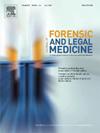A fatal case of gastropericardial fistula due to a benign gastric ulcer
IF 1.2
4区 医学
Q3 MEDICINE, LEGAL
引用次数: 0
Abstract
Gastropericardial fistula caused by a benign gastric ulcer is a rare condition, with few fatal cases documented in forensic medicine. A healthy man in his 40s presented with chest pain and fever. Pericardiocentesis produced exudative fluid with a markedly elevated adenosine deaminase level, leading to an initial diagnosis of tuberculous pericarditis and initiation of antituberculous therapy. Despite treatment, the patient deteriorated. On hospital day 43, gastric contents were observed draining from a mediastinal tube. Upper endoscopy revealed a large gastric ulcer that had perforated the diaphragm and communicated directly with the pericardial cavity. The patient died of multi-organ failure on day 55. Forensic autopsy revealed a 7-cm chronic gastric ulcer penetrating the left hemidiaphragm and forming a 1-cm fistula with the pericardial sac, and no evidence of tuberculosis. This case highlights the need to consider gastropericardial fistula in patients with unexplained pericarditis, especially if atypical effusions or alimentary material are noted in thoracic drains. Early recognition followed by urgent surgical intervention may be life-saving. Furthermore, from a forensic perspective, it highlights the need to consider gastropericardial fistulas in healthy adults with unexplained chest pain in the context of sudden death.
良性胃溃疡致胃心包瘘1例死亡
由良性胃溃疡引起的胃心包瘘是一种罕见的疾病,在法医学上很少有致命的病例记录。一名40多岁的健康男子出现胸痛和发烧症状。心包穿刺产生渗出液,腺苷脱氨酶水平明显升高,导致结核性心包炎的初步诊断和抗结核治疗的开始。尽管接受了治疗,病人的病情还是恶化了。住院第43天,胃内容物从纵隔管排出。上腔镜检查显示有一个很大的胃溃疡,穿孔横膈膜并直接与心包腔相连。患者于第55天死于多器官衰竭。法医尸检发现一个7厘米的慢性胃溃疡穿透左膈,并在心包囊形成一个1厘米的瘘管,没有肺结核的证据。本病例强调了不明原因心包炎患者需要考虑胃心包瘘,特别是当胸廓引流液中发现非典型积液或消化物质时。早期识别并进行紧急手术干预可能挽救生命。此外,从法医的角度来看,它强调了在突然死亡的情况下,有必要考虑患有不明原因胸痛的健康成年人的胃心包瘘。
本文章由计算机程序翻译,如有差异,请以英文原文为准。
求助全文
约1分钟内获得全文
求助全文
来源期刊

Journal of forensic and legal medicine
MEDICINE, LEGAL-
CiteScore
2.70
自引率
6.70%
发文量
106
审稿时长
57 days
期刊介绍:
The Journal of Forensic and Legal Medicine publishes topical articles on aspects of forensic and legal medicine. Specifically the Journal supports research that explores the medical principles of care and forensic assessment of individuals, whether adult or child, in contact with the judicial system. It is a fully peer-review hybrid journal with a broad international perspective.
The Journal accepts submissions of original research, review articles, and pertinent case studies, editorials, and commentaries in relevant areas of Forensic and Legal Medicine, Context of Practice, and Education and Training.
The Journal adheres to strict publication ethical guidelines, and actively supports a culture of inclusive and representative publication.
 求助内容:
求助内容: 应助结果提醒方式:
应助结果提醒方式:


